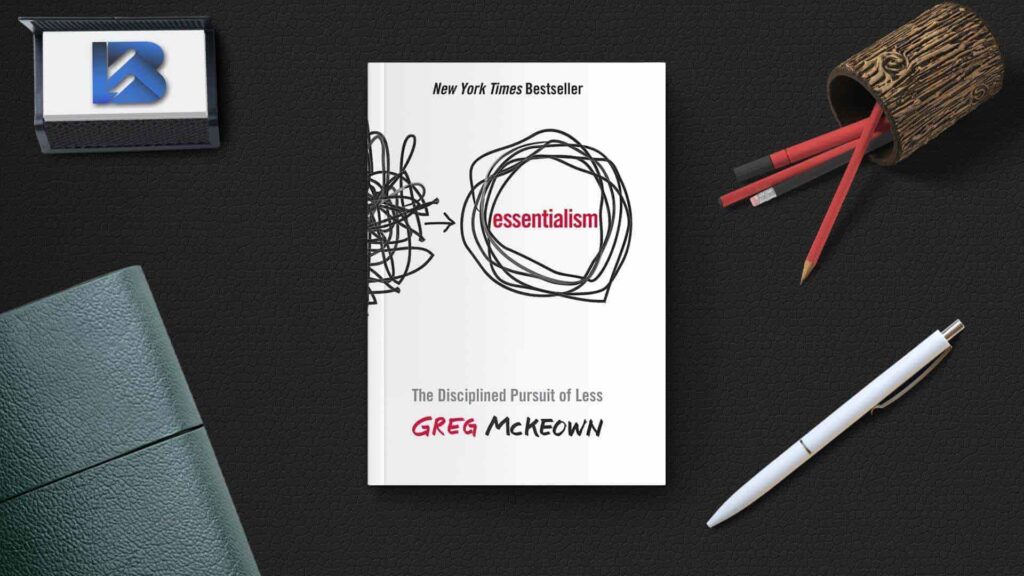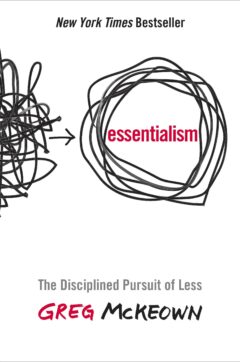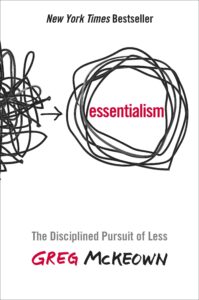Introduction to Essentialism: The Disciplined Pursuit of Less eBook by Greg McKeown
Greg McKeown shows you how to do less work and get better results in The Originality. This work is not in praise of laziness! Instead, with the help of the practical and strategic solutions provided in it, you can take a big step towards achieving more desirable results by addressing the essential tasks. It should be noted that this Book is on the New York Times bestseller list.

About the Essentialism: The Disciplined Pursuit of Less 2014 book:
Do you always do your best? You consider one of your positive characteristics to be “the ability to do several things simultaneously,” and you spend a lot of time on different things. However, you still need to get the desired result. Greg McKeown considers the golden solution to your problems Essentialism: The Disciplined Pursuit of Less. By reading this Book, you will learn to say no. Because transparency and focus are two essential components on the way to perfectionism, and with their help, you can finish your most important tasks first instead of feeling suffocated under the onslaught of half-finished activities.
Greg McKeown teaches you the art of choosing and trading. An essentialist knows precisely how and where to spend his time and energy, and essentialism without compromise loses its meaning. Few things in life are precious. Fundamentalism tells you that most of your effort should be spent on finding these things. Also, this is why you have to remember that you, as a human, cannot do everything or have everything. By accepting these things, you will be more honest with yourself and have more realistic expectations.
The Book of Essentialism consists of four parts. In the first part, the mentality of an essentialist is described in detail, and the following three parts turn this mentality into a systematic process of searching for rules as little as possible so that you can use them in every situation and situation you encounter. If you want to eliminate those extra tasks, achieve a more successful result and stop wasting your precious time, this Book can change your life.
This work was first published in 2014, and since its publication, it has been widely accepted by the audience, critics, and famous people such as Jeff Weiner (CEO of LinkedIn) and Chris Guilbeau (author). The author’s efforts are to provide new and innovative content to the audience, and its solutions apply to everyone. This feature has made the Essentialism book far from the typical stereotypes of works related to time management and self-help. Also, numerous examples are other things that make this book different from other works.
Criticisms of the Essentialism PDF Book:
- As a confessed maximalist who wants to do everything, this book improved my life. (Chris Gilbo, author of the book Hundred Dollar Startup)
- Have a competitive edge in the new year with originality, learn to identify the right things, focus on doing them and forget the rest. In other words, do less but better. (Forbes)
- Following the clear and intelligent directions of the book will help the readers to find Essentialism. (Success Magazine)
Who is the Essentialism ebook suitable for?
If you want to perform better and make the most of your time, the book of Essentialism will significantly help you.
Get to know more about Greg McKeown:
He owes most of his fame to his best-selling book, Fundamentalism, which has sold over a million copies. Craig McKeon has taught in many prestigious companies and media worldwide, including Facebook, Apple, Google, and Twitter, and the World Economic Forum mentions him as a young global leader. Among his other famous works, we can mention ease.
Selected sentences of the Essentialism by Greg McKeown book:
- Someone else will do it for you if you don’t prioritize your life.
- Get more production by removing more
- Do something daily that brings you one centimeter closer to a better tomorrow.
- Many capable people stop reaching the higher levels of their performance in their goal path because they cannot let go of the belief that “everything is important.”
In a part of the ebook of Essentialism 2014 by Greg McKeown, we read:
There is a popular idea in Silicon Valley: “Done is better than perfect.” This opinion does not mean that we should produce garbage. As I understand it, it’s about not wasting time on unnecessary things and just getting the job done. In entrepreneurial circles, this idea is expressed as creating a “minimum acceptable product.” The idea is as follows: “What is the simplest possible product that is practical and valuable for the target customer?”.
We can also use the “minimum practical progress” method. We can ask ourselves, “What is the smallest amount of progress that is valuable and useful for doing the important work we are considering?”. I used the same method to write this book. For example, when I was still in the research phase of writing a book, I would share a short idea (my minimal, practical product) on Twitter before I even put pen to paper (or fingers to keyboard). If I got responses from people there, I would write an article on the Harvard Business Review blog. Through this process of repetition, which required little effort, I could understand where the connection was made between what I was thinking and what was most relevant in other people’s lives.
This is the process that Pixar uses in its films. Instead of starting with a screenplay, they begin with an illustrated script or, as they call it, a comic book version of a movie. They test different ideas and see which ones work. They do this several hundred times in short cycles. A film is then shown to small groups of people to give its initial feedback. This allows them to learn quickly with as little effort as possible. As Jon Lester, the chief creative officer at Pixar and now Disney, said, “We don’t finish our movies. We release them.”
Table of contents of the Essentialism: The Disciplined Pursuit of Less eBook
- The first chapter: essentialist
- First part: Nature
- The second chapter: Selection
- The third chapter: Diagnosis
- Chapter 4: Exchange
- The second part: Exploration
- Chapter 5: Escape
- Chapter 6: Looking
- Chapter 7: Game
- Chapter 8: Sleep
- Chapter 9: Choosing
- The third part is: deletion
- Chapter 10: Clarification
- Chapter 11: Courage
- Chapter 12: Freedom from Attachment
- Chapter 13: Dressing up
- Chapter 14: Limiting
- The fourth part: the implementation
- Chapter 15: Hitting
- Chapter 16: Cut
- Chapter 17: Progress
- Chapter 18: Flow
- Chapter 19: Concentration
- Chapter 20: Being
- the attachment
- notes
Dear friends, support the respected author by legally purchasing the book. Click here to buy. (All writers’ income is from the same support)



Similar books
The Sale: The Number One Strategy to Build Trust and Create Success 2022
Oil and Gas Processing Equipment: Risk Assessment with Bayesian Networks 2020
Unfu*k Yourself: Get Out of Your Head and into Your Life 2017
Rich Dad Poor Dad: 20th Anniversary Edition